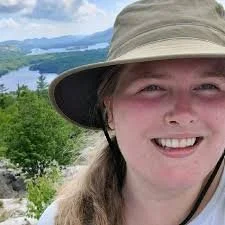
Meet the Team
Dr. Kelly Biagi (PI)
Welcome! I am the founder of the Landscape Hydrology and Restoration Group based in the Department of Earth Sciences at Brock University. My research aims to understand the effect of landscape mitigation practices on ecosystem hydrology and hydrochemistry to provide guidance on the effectiveness of those strategies. I am most interested in wetland-watershed systems as they play a critical role in the landscape.
I completed my Bachelor of Science in Environmental Science at Dalhousie University in Halifax, Nova Scotia (2008 - 2013). I completed my M.Sc. (2013 – 2015) and Ph.D. (2016 – 2021) at McMaster University in environmental science with a focus in hydrological sciences. There, I studied the hydrological and hydrochemical functioning of reconstructed wetland systems in the Athabasca oil sands region of Canada.
Following these degrees, I worked as a post-doctoral fellow at the Toronto Metropolitan University where I studied the nutrient loads from Lower Great Lakes headwater streams to better understand the distribution of nutrient loads, their causes and potential mitigation strategies to limit excess nutrients.
MSc Students
Lindsay Taylor
Hi! My name is Lindsay, and I am a Research Assistant specializing in urban hydrology and green infrastructure (GI) performance. I earned my B.A. (Hons.) in Labour Studies with a minor in Psychology from Brock University, followed by technical training as an Environmental Technician and post-graduate studies in Ecosystem Restoration. This applied training provided me with foundational expertise in field hydrology, soil assessment, and water quality monitoring.
I am currently undertaking my M.Sc. in Earth Science, where my thesis focuses on unit-scale hydrologic modelling of nature-based stormwater infrastructure. My research specifically investigates methodologies to quantify, compare, and integrate GI systems into municipal asset management frameworks in response to evolving requirements under O. Reg. 588/17. My ultimate research objective is to develop practical tools that enable municipalities to evaluate stormwater asset performance, forecast lifecycle trajectories, and plan for climate-resilient infrastructure.
Research Assistants
Lorelei Penn
Hi! I'm Lorelei and I'm an undergraduate student in Environmental Geoscience at Brock University. I've always loved environmental science and have been fascinated by wetlands and their crucial role in supporting ecosystems. Because I spend so much time outdoors - both for work and leisure - it's important to me that my work contributes to the preservation and betterment of the environment so that everyone can continue to enjoy and benefit from it. On weekends, I work on a pony farm, travelling across Niagara to festivals where we offer pony rides to kids. I'm an animal lover through and through, and my bunny Atari is (almost) always by my side.
Catharine Holmes
Catherine is entering her final year of the Earth Science program at Brock University, with interests spanning hydrology, mineralogy, and planetary science. Her research with Dr. Biagi has further sparked her interest in hydrology and hydrogeology, particularly in how they might intersect with other areas such as planetary science in future projects or graduate studies. This summer, she is contributing to an expanded wetland monitoring project through field sampling and lab work across multiple sites. Her focus includes both soil and water analysis, with emphasis on better understanding changes associated with wetland restoration – particularly at sites like Saint George Park in Welland, which is planned for reconstruction. Originally from Colorado, Catherine studied medical sciences before transitioning to Earth Science, where she has found her background in chemistry and biology especially helpful for the hydrochemical aspects of this research.
Previous Members
Annaliese Paczynski
I’m in my final year of my Bachelors in Earth Science at Brock University and have been involved in research into the hydrology of local wetlands. In particular, I completed a special topics project on Gonder’s Flats, a wetland along the Niagara River, where nutrient analysis showed that phosphorus inputs were up to 40 times higher than recommended limits. I hope to use my knowledge of hydrology in a future career in environmental consulting. In my free time, I am usually busy taking care of my garden or working on countless different sewing projects.
Jack Comerford
Jack is an undergraduate student studying Environmental Geoscience at Brock University. He is particularly interested in hydrology, climatology, and biogeochemistry of freshwater systems. Prior to his time at Brock University, Jack worked as an actor (and by extension, a bartender) in Toronto. For 2 years, he was a key organizational member for the Toronto Bike Brigade, which helped to reduce pollution from last mile deliveries within the city. Working under Kelly Biagi in her research into remediated wetlands such as Gonder's Flats and Carlisle Conservation area has only heightened Jack's interest in human-influenced hydrological systems. He hopes to continue working to build a more sustainable ecologically equitable future.






